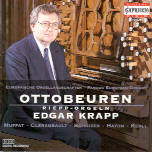Part of Capriccio’s “Famous European Organs” series, this CD presents music from the Baroque and Classic periods, played with flair and sensitivity on the Riepp organs of the Benedictine abbey of Ottobeuren. These are modest instruments, yet capable of making quite a formidable sound when the right stops are pulled, as in the raucous Battaglia by Johann Kerll. Most listeners, however, will be more enchanted with the many dulcet sound combinations exhibited here. Consider the lovely flutes at the beginning of Haydn’s Aus der Flötenuhr or the charming combination of Copel 8′ coupled with Doublet 2′ in the opening movement of the Franz Schnizer Sonate. Credit must go to the organ builder for providing the opportunities, but also to organist Edgar Krapp, who is unerringly sensitive in picking exactly the right tonal combination for each work. Clarity seems to be his watchword, a cue that is caught perfectly by the recording team. Even in the most complex passages, every line is absolutely clear, with uncanny presence.
































